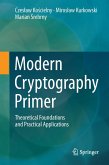The author offers an extensive overview of the most practical and efficient modern techniques used in the design and implementation of secure computation and related protocols. After an introduction that sets secure computation in its larger context of other privacy-enhancing technologies such as secure channels and trusted computing, he covers the basics of practically efficient secure function evaluation, circuit optimizations and constructions, hardware-assisted garbled circuit protocols, and the modular design of efficient SFE protocols.
The goal of the author's research is to use algorithm engineering methods to engineer efficient secure protocols, both as a generic tool and for solving practical applications, and he achieves an excellent balance between the theory and applicability. The book is essential for researchers, students and practitioners in the area of applied cryptography and information security who aim to construct practical cryptographic protocols for privacy-preserving real-world applications.
Dieser Download kann aus rechtlichen Gründen nur mit Rechnungsadresse in A, B, BG, CY, CZ, D, DK, EW, E, FIN, F, GR, HR, H, IRL, I, LT, L, LR, M, NL, PL, P, R, S, SLO, SK ausgeliefert werden.
"This book, an elaboration of the author's PhD thesis, presents alternative approaches to the development of secure two-party computation protocols based on secure function evaluation (SFE). ... Directions for future research are offered and a comprehensive bibliography is provided. In a nutshell, this is an interesting book that could be used in a vertical way by implementers, practitioners, and graduate students. Security practitioners could use it in broader terms to support their horizon scanning techniques for emerging technologies." (Alessandro Berni, ACM Computing Reviews, December, 2012)









